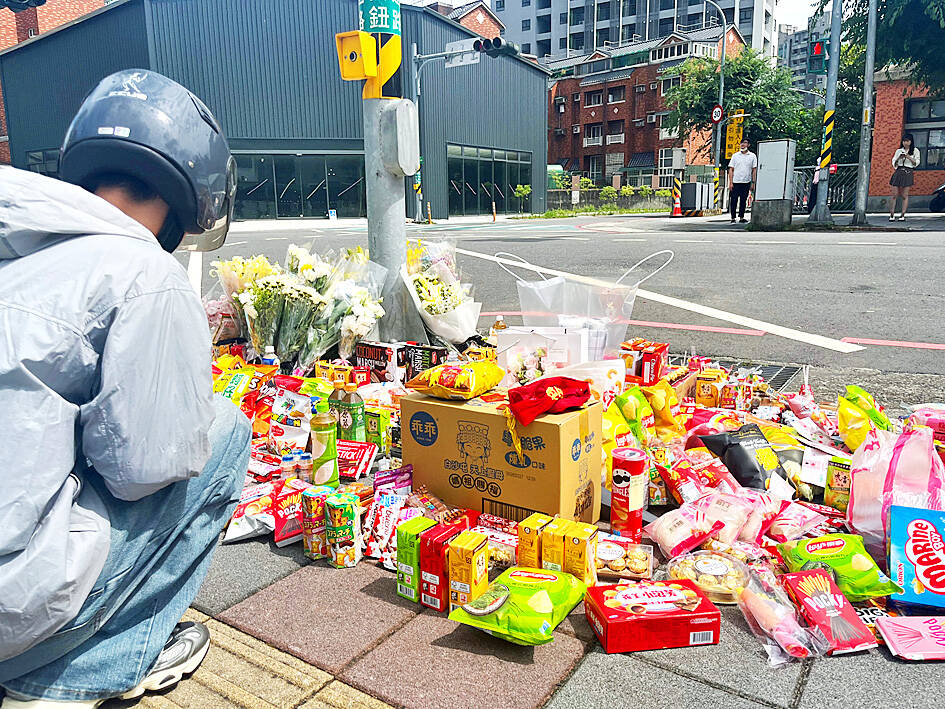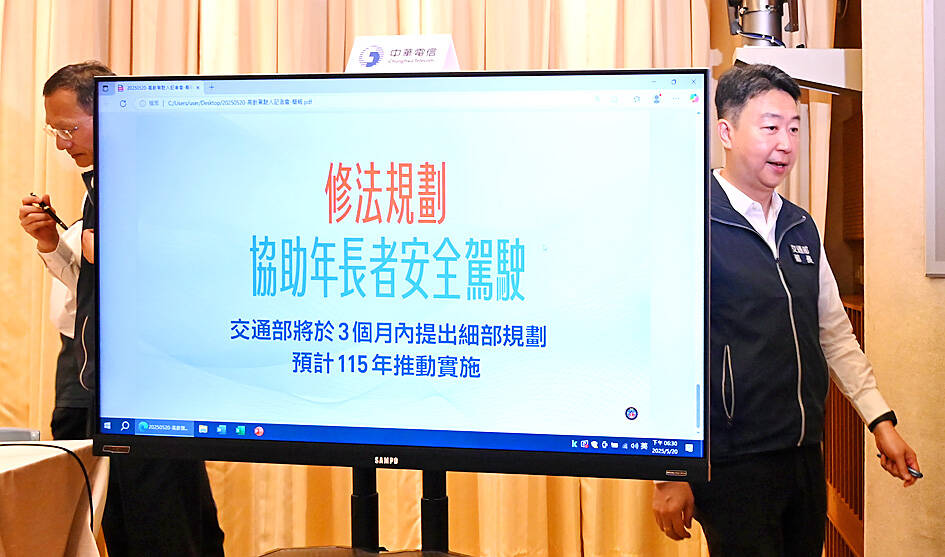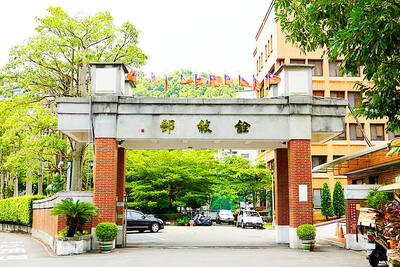The Ministry of Transportation and Communications yesterday said it would lower the age for elderly drivers to renew their license from 75 to 70 as part of efforts to address safety issues caused by senior motorists.
The new policy was proposed in light of a deadly incident on Monday in New Taipei City’s Sansia District (三峽), in which a 78-year-old motorist surnamed Yu (余) sped through a school zone, killing three people and injuring 12.
Last night, another driver sped down a street in Tainan’s Yuching District (玉井), killing one pedestrian and injuring two.

Photo: CNA
The incidents have sparked public discussion over whether seniors should be asked to stop driving after reaching a certain age.
Article 52-2 of the Road Traffic Security Rules (道路交通安全規則) stipulates that drivers aged 75 or older or those aged 75 who have contravened traffic regulations or have had their license suspended must renew their license every three years.
They are allowed to renew their license only after they pass a physical exam and driving test. Those who failed the tests would be required to turn in their license, and the government can revoke their license if they refuse to comply.

Photo: Liu Hsin-de, Taipei Times
“We are aware that the public is concerned about safety issues caused by elderly drivers, but official data show that drivers aged 18 to 24 are still the most likely to cause traffic accidents,” Minister of Transportation and Communications Chen Shih-kai (陳世凱) told a news conference in Taipei.
The ministry recently unveiled three main changes to driver’s license tests, with one of them being assisting elderly motorists in driving safely.
As Taiwan would soon become a super-aged society, the number of drivers aged 70 or older could reach 2.72 million by 2035, up from 1.82 million this year, Chen said.
The ministry decided to adopt measures similar to those in Japan, which is already a super-aged society and has effectively tackled the problems of senior drivers, Chen said.
The ministry would propose that the age threshold for elderly drivers to renew their license be lowered to 70 from 75, and those with records of traffic contraventions must complete safe driving training on roads, he said.
Aside from passing cognitive tests and physical exams, elderly drivers must also participate in a hazard perception and road traffic safety education program, he said.
The Highway Bureau would continue to send care messages to drivers aged 65 or older who have accumulated three demerits or more for traffic contraventions, but it would in the future send care messages to those who frequently contravene traffic rules or have been directly responsible for causing traffic accidents, he said.
Elderly drivers who voluntarily return their drivers’ license would receive a subsidy when they purchase T-Pass, a program introduced by the Executive Yuan to encourage use of the public transport system, he said.
“We would work out details of these reforms in three months,” Chen said, adding that the new policies are scheduled to be implemented next year.
Ministry data show that the number of deadly traffic accidents caused by drivers 75 or older rose from 642 in 2020 to 740 last year, with the number of people killed jumping from 751 to 824.
The percentage of accidents caused by elderly drivers increased from 9.1 percent in 2016 to 10.2 percent in 2017, 11.1 percent in 2018, 11.6 percent in 2019, 12.3 percent in 2020, 13 percent in 2021, 13.2 percent in 2022, 13.9 percent in 2023 and 14.9 percent last year.
Last year, “zoning out, nervousness and absent-mindedness” were identified as the No. 1 cause of fatal accidents directly caused by elderly drivers, followed by improper driving behavior, running red lights and failure to yield to pedestrians.
As of last month, 44.2 percent of drivers aged 75 or older had renewed their license as required, while 23.3 percent had voluntarily returned their driver’s license.

Taiwan Semiconductor Manufacturing Co (TSMC, 台積電) is expected to start construction of its 1.4-nanometer chip manufacturing facilities at the Central Taiwan Science Park (CTSP, 中部科學園區) as early as October, the Chinese-language Liberty Times (the Taipei Times’ sister newspaper) reported yesterday, citing the park administration. TSMC acquired land for the second phase of the park’s expansion in Taichung in June. Large cement, construction and facility engineering companies in central Taiwan have reportedly been receiving bids for TSMC-related projects, the report said. Supply-chain firms estimated that the business opportunities for engineering, equipment and materials supply, and back-end packaging and testing could reach as high as

CHAMPIONS: President Lai congratulated the players’ outstanding performance, cheering them for marking a new milestone in the nation’s baseball history Taiwan on Sunday won their first Little League Baseball World Series (LLBWS) title in 29 years, as Taipei’s Dong Yuan Elementary School defeated a team from Las Vegas 7-0 in the championship game in South Williamsport, Pennsylvania. It was Taiwan’s first championship in the annual tournament since 1996, ending a nearly three-decade drought. “It has been a very long time ... and we finally made it,” Taiwan manager Lai Min-nan (賴敏男) said after the game. Lai said he last managed a Dong Yuan team in at the South Williamsport in 2015, when they were eliminated after four games. “There is

Democratic nations should refrain from attending China’s upcoming large-scale military parade, which Beijing could use to sow discord among democracies, Mainland Affairs Council Deputy Minister Shen You-chung (沈有忠) said. China is scheduled to stage the parade on Wednesday next week to mark the 80th anniversary of Japan’s surrender in World War II. The event is expected to mobilize tens of thousands of participants and prominently showcase China’s military hardware. Speaking at a symposium in Taichung on Thursday, Shen said that Chinese Minister of Foreign Affairs Wang Yi (王毅) recently met with Indian Prime Minister Narendra Modi during a visit to New Delhi.

FINANCES: The KMT plan to halt pension cuts could bankrupt the pension fund years earlier, undermining intergenerational fairness, a Ministry of Civil Service report said The Chinese Nationalist Party (KMT) caucus’ proposal to amend the law to halt pension cuts for civil servants, teachers and military personnel could accelerate the depletion of the Public Service Pension Fund by four to five years, a Ministry of Civil Service report said. Legislative Speaker Han Kuo-yu (韓國瑜) on Aug. 14 said that the Act Governing Civil Servants’ Retirement, Discharge and Pensions (公務人員退休資遣撫卹法) should be amended, adding that changes could begin as soon as after Saturday’s recall and referendum. In a written report to the Legislative Yuan, the ministry said that the fund already faces a severe imbalance between revenue